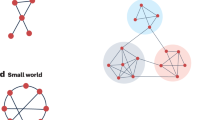Abstract
Revolutionary advances in technology have generated numerous complex systems that have become integral parts of our socioeconomic environment. The study of such systems – those which contain many interacting parts – is currently attracting considerable attention.
In this paper, the author retraces his personal attempts, over a period of four decades, to develop simple models for adaptation, learning, identification and control using artificial neural networks, and hybrid systems, and goes on to describe how they are providing insights into dealing with complex interconnected systems.
Preview
Unable to display preview. Download preview PDF.
Similar content being viewed by others
References
Bellman, R.: Adaptive Processes – A Guided Tour. Princeton University Press, Princeton (1961)
Parks, P.C.: Lyapunov redesign of model reference adaptive control systems. IEEE Trans. Aut. Control AC-11, 362–367 (1966)
Narendra, K.S., Annaswamy, A.M.: Stable Adaptive Systems. Prentice-Hall, Englewood Cliffs (1989)
Carroll, R., Lindorff, D.P.: An adaptive observer for single-input single-output linear systems. IEEE Transactions on Automatic Control 18, 428–435 (1973)
Luders, G., Narendra, K.S.: An adaptive observer and identifier for a linear system. IEEE Trans. Aut. Control 18, 496–499 (1973)
Kreisselmeier, G.: Adaptive observers with exponential rates of convergence. IEEE Trans. Aut. Control 22, 2–8 (1977)
Monopoli, R.V.: Model reference adaptive control with an augmented error signal. IEEE Trans. Aut. Control AC-19, 474–484 (1974)
Narendra, K.S., Lin, Y.-H., Valvani, L.S.: Stable adaptive controller design, part ii: proof of stability. IEEE Trans. Aut. Control AC-25, 440–448 (1980)
Goodwin, G.C., Ramadge, P.J., Caines, P.E.: Discrete-time multivariable adaptive control. IEEE Trans. Aut. Control AC-25, 449–456 (1980)
Morse, A.S.: Global stability of parameter adaptive control systems. IEEE Trans. Aut. Control AC-25, 433–439 (1980)
Ioannov, P.A., Sun, J.: Robust Adaptive Control. Prentice Hall, Englewood Cliffs (1996)
Kristic, M., Kannellakopoulos, I., Kokotous, P.V.: Nonlinear design of adaptive controllers for linear systems. IEEE Trans. Aut. Control 39, 738–752 (1994)
Seto, D., Annaswamy, A.M., Ballieul, J.: Adaptive control of nonlinear systems with triangular structure. IEEE Trans. Aut. Control 39, 1411–1428 (1994)
Narendra, K., Thathachar, M.A.L.: Learning Automata – An Introduction. Prentice-Hall, Englewood Cliffs (1989)
Norman, M.F.: On linear models with two absorbing barriers. J. Math. Psych. 5, 225–241 (1968)
Shapiro, I.J., Narendra, K.S.: Use of stochastic automata for parameter selfoptimization with multi-modal performance critera. IEEE Trans. Sys. Sci. Cyber. SSC-5, 352–360 (1969)
Narendra, K.S., Wheeler, R.M.: An n-player sequential stochastic game with identical payoffs. IEEE Trans. Sys. Man Cyber. SMC-13, 1154–1158 (1983)
Narendra, K.S., Thathachar, M.A.L.: On the behavior of learning automata in a changing environment with application to telephone traffic routing. IEEE Trans. Sys. Man Cyber. SMC-10, 262–269 (1980)
Narendra, K.S., Parthasarathy, K.: Identification and control of dynamical systems using neural networks. IEEE Trans. Neur. Networks 1, 4–27 (1990)
Cabrera, J.B.D., Narendra, K.S.: Issues in the application of neural networks for tracking based on inverse control. IEEE Trans. Aut. Control 44(11), 2007–2027 (1999)
Narendra, K.S., Balakrishnan, J.: Adaptive control using multiple models. IEEE Trans. Aut. Control 42(2) (February 1997)
Author information
Authors and Affiliations
Editor information
Editors and Affiliations
Rights and permissions
Copyright information
© 2005 Springer-Verlag Berlin Heidelberg
About this chapter
Cite this chapter
Narendra, K.S. (2005). From Feedback Control to Complexity Management: A Personal Perspective. In: Murray-Smith, R., Shorten, R. (eds) Switching and Learning in Feedback Systems. Lecture Notes in Computer Science, vol 3355. Springer, Berlin, Heidelberg. https://doi.org/10.1007/978-3-540-30560-6_1
Download citation
DOI: https://doi.org/10.1007/978-3-540-30560-6_1
Publisher Name: Springer, Berlin, Heidelberg
Print ISBN: 978-3-540-24457-8
Online ISBN: 978-3-540-30560-6
eBook Packages: Computer ScienceComputer Science (R0)




